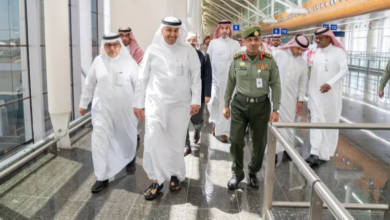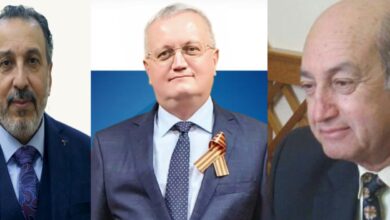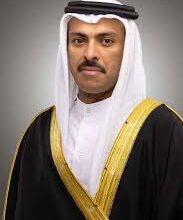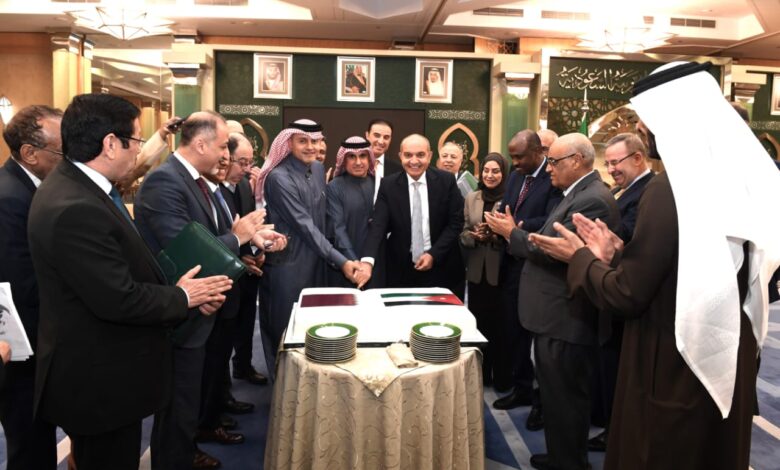
Ashraf AboArafe
For regional & international challenges.. Today, His Excellency Ambassador Abdulaziz bin Abdullah Al-Matar, the permanent representative of the Kingdom of Saudi Arabia to the League of Arab States (LAS), received at the headquarters of the Kingdom’s delegation in Cairo today the permanent members of the League of Arab States to consult on how to reform the performance of the Arab organization to achieve the hopes of the Arab people from the ocean to the Gulf as the Middle witnesses political, military, cultural and social developments…which require investing in the idea.
The ambassadors of all Arab countries expressed their appreciation to the Kingdom of Saudi Arabia for its enlightened interest in developing the House of Arabs.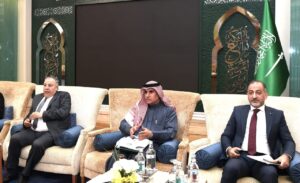
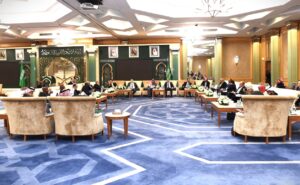

* About!
The League of Arab States is a regional organization that includes Arab countries in Asia and Africa. Its charter provides for coordination among member states in economic affairs, including trade relations, communications, cultural relations, nationalities, travel documents and permits, social relations, and health. The permanent headquarters of the League of Arab States is located in Cairo, the capital of Egypt (Tunisia from 1979 to 1990). Its current Secretary General is Ahmed Aboul Gheit. The total area of the member states of the organization is 13,953,041 km², as the total area of the Arab world makes its area second in the world after Russia, and its total population is fourth in the world after China, India, and the European Union. The total Arab population in the Arab world in 2021 is approximately 437,812,546 people, which represents 5.5% of the world’s population of 7,956,486,115 people.
The Arab League facilitates political, economic, cultural, scientific and social programs to advance the interests of the Arab world through institutions such as the Arab Educational, Cultural and Scientific Organization (ALESCO) and the Council of Arab Economic Unity. The Arab League served as a forum for coordinating the political positions of member states, for deliberating and discussing issues of common concern, and for settling some Arab disputes and reducing their conflicts, such as the Lebanon crisis in 1958. The League also represented a platform for drafting and concluding many historical documents to enhance economic integration between the League’s countries. . One example of such an important document is the Joint Arab Economic Action Document, which defines the principles of economic activities in the region.
Each member state has one vote in the League Council, but decisions bind only those states that voted for these decisions. The university’s goals in 1945 were:
Promoting and coordinating the political, cultural, economic and social programs of its members.
Mediating in resolving disputes that arise between its countries, or disputes between its countries and third parties.
Countries that signed the Agreement on Mutual Defense and Economic Cooperation on April 13, 1950 are obliged to coordinate military defense measures.
The Arab League played an important role in formulating school curricula, advancing the role of women in Arab societies, promoting child care, encouraging youth and sports programs, preserving Arab cultural heritage, and promoting cultural exchanges between member states. Literacy campaigns, copies of intellectual works, and translation of modern technical terms for use within member states have been launched. The university also encourages taking the necessary measures to combat crime and drug abuse, and to deal with labor issues, especially among the Arab workforce working abroad.
With the beginning of the Arab Renaissance, the Renaissance revived feelings of Arab identity, and some thinkers and politicians began to call for Arab unity, such as Jurji Zidane. One of the culmination of this movement was the founding of the League of Arab States. Some Arab presidents, leaders, and thinkers have called for replacing the League of Arab States with a more close and interconnected Arab union. Many politicians were called to create an Arab union, such as: King Abdulaziz, Nouri Al-Saidi, Hashim Al-Atassi, Gamal Abdel Nasser, Hafez Al-Assad, Ahmed Hassan Al-Bakr, Faisal I of Iraq, Muammar Gaddafi, Saddam Hussein, Jaafar Al-Numeiri, and Muhammad Anwar Sadat. The proposals varied between a total unit, between two countries, or a unit that would develop from the Arab League in the same manner as other organizations.

